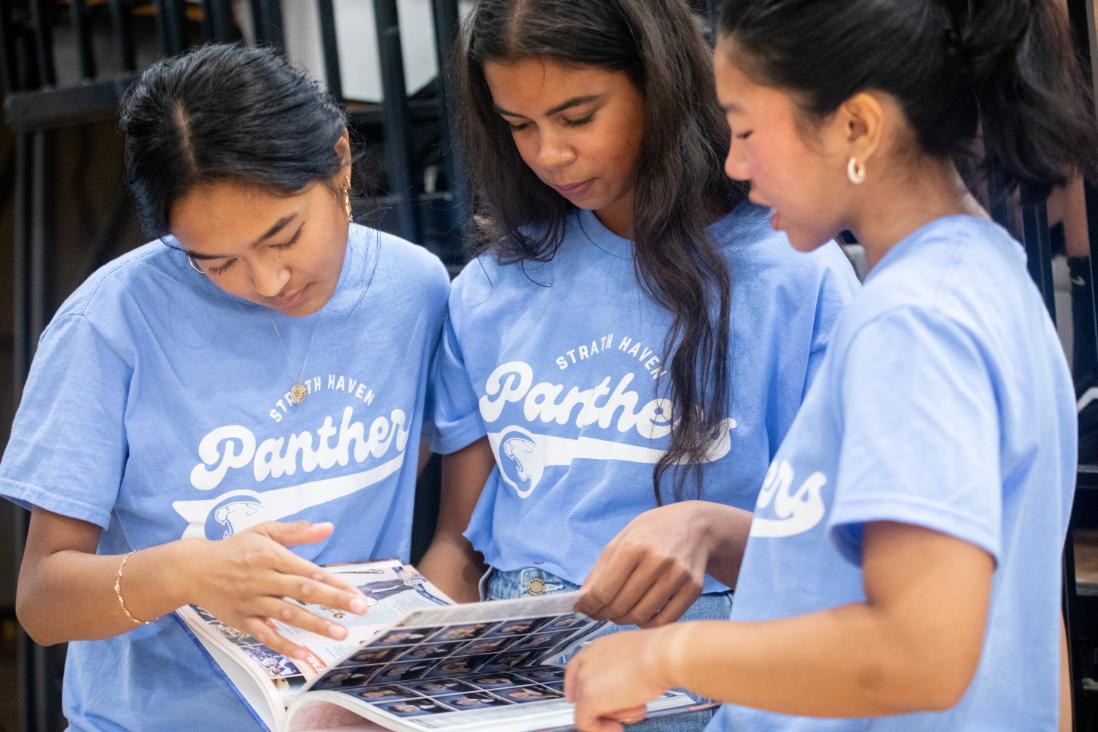The ninth grade English class lasts a full year and earns two credits for freshmen. The course title is “English 9: Introduction to World Literature and Academic Writing,” according to the Silver Guide.
Despite some variation in their approaches, the freshman English teachers are very supportive of one another.
“I think our ninth grade team is really close-knit, and we work as a team and as a unit,” English teacher Ms. Kate Evans said.
What books do you read in your ninth grade English curriculum?
Ms. Reagan Lattari: We start the year with different mythological sources. The purpose of the mythology is to create a foundation for “The Odyssey,” so there has to be a lot of Greek mythology. “The Odyssey,” “Romeo and Juliet,” “Lord of the Flies.” In addition to the curricular books, my kids read anywhere between five to 20 personal choice books throughout the year.
Mr. Dan Peterson: “The Odyssey,” “Romeo and Juliet,” “Bone Gap,” “With the Fire on High,” and short stories.
Ms. Kate Evans: “Of Mice and Men,” “Romeo and Juliet,” “Lord of the Flies,” and dystopian fiction.
Mr. Matthew Morris: “The Odyssey,” “Of Mice and Men,” “Romeo and Juliet,” and we’ll do one more novel but I’m still deciding what it will be.
Mr. Chris McMahon: “The Odyssey,” “Romeo and Juliet,” “Lord of the Flies,” and “Of Mice and Men.” And students read a choice of their own throughout the semester and I don’t assess them on those. The hope is that a student will read a book a month. But a student might have time issues with other classes that might crowd out some of their reading time.
Ms. Katelyn Scaffidi: “The Odyssey,” “Romeo and Juliet,” “Lord of the Flies,” and “Of Mice and Men.”
What is your favorite of these books to teach?
Latteri: “The Odyssey.” It is a book that literally connects to everything we go through in our lives. And it shows so much of where our culture comes from.
Peterson: “Lord of the Flies” because we do all the fun tribal activities. Students are put in groups and they come up with a tribe name and chief, and they compete against each other in academic and fun competitions.
Evans: “Of Mice and Men,” because it’s coming after “The Odyssey” and “The Odyssey” is a lot harder. It’s a much longer book and the kids sometimes get tired of it and we have to keep pushing through. “Of Mice and Men” is heartwarming even though it’s really sad. And I love the way Steinbeck writes.
Morris: “The Odyssey” and “Romeo and Juliet” are my favorites. I like “The Odyssey” because I really like mythology. I used to teach mythology and it has always been one of my areas of special interest. And I like “Romeo and Juliet” because I’m involved and interested in theater. I think sometimes because people assume it’s an old play, people think it’s not relatable. It’s a situation that is charged with emotion and people acting the same way that people who are very emotional today would act.
McMahon: Each one has its own special place in my heart. Romeo is a bit older, but he’s trying to make adult choices and he’s not [an adult]. And it’s interesting to look at this. It can teach use to think about what we’re acting on and seek the counsel of somebody before we make a final decision.
Scaffidi: “Romeo and Juliet” because it can be really fun if you have students rewrite parts of the text and perform their own skits. It’s just fun and something different.
What is unique about your approach to teaching ninth grade English?
Lattari: Out of all the ninth grade teachers, I’m the one who spends the most time on mythology. I get them to see that this book from antiquity can connect to their daily lives. I also approach “Of Mice and Men” differently than the rest of the team. I focus so much on how the time and place affect the story.
Peterson: I focus on engagement, critical thinking, and fun.
Evans: I make sure the kids are heard. I read the room. If I notice that kids are tired and need a break, I can give them a break because it’s a year-long class so I have the time. So I balance fun and work.
Morris: I find something to like in everything that I teach and everyone that I teach.
McMahon: I try to make the assignments as grounded and realistic as possible. I would not assign something that is beyond the abilities of the students in my classroom.
Scaffidi: I try to do a variety of projects each week to keep things interesting.*














